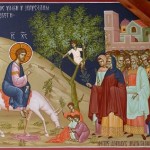 1 Corinthians 10:1-13
1 Corinthians 10:1-13
If you’ve ever wondered about the value of reading the Old Testament, you’ve come to the right place, for in 1 Corinthians 10 St. Paul explains how we might profitably read the Old Testament for our edification. Actually, in 1 Corinthians 9:8ff he already gave us a lesson on how to interpret some of the laws (using the law about not muzzling the ox as an example.)
Paul begins by teaching that even in the Old Testament Jesus Christ was with His people through the Sacraments, His visible means of grace. Though we know that entrance into God’s covenant was through circumcision in the Old Covenant, Paul makes a remarkable connection between the Red Sea experience and baptism. Just as all of the Israelites had to have the blood of the Passover Lamb on their door to be saved, all of the Israelites had to pass through the waters of the Red Sea, or be baptized in Red Sea, or they would not be saved. Any Israelite who did not pass through the water would have been drowned with Pharaoh’s army, and any Israelite who did pass through the waters was kept alive. The Church Fathers affirmed the waters of the Red Sea as representing baptism, and they understood the cloud to represent the Holy Spirit, particularly the grace of baptism in the Holy Spirit.
Just as the Israelites ate the Passover, and it became a Sacrament for them, all of the Israelites, Paul says, ate the same spiritual food and drank the same spiritual drink. Knowing that later in this chapter Paul re-introduces the idea of eating and partaking of the altar, and the Lord’s table, and that he spends most of Chapter 11 on the Lord’s Supper, it only makes sense that Paul has the Lord’s Supper in mind here as well.
When the Israelites ate the manna every day, they were partaking of a Sacrament, an outward and visible sign of an inward and spiritual grace. This food was called the heavenly food, and it is clear that it was a supernatural gift and not like other food. Likewise, the water that came from the rock was a sacrament because through it God made His grace visible, and His grace came through partaking of the Sacrament.
As Paul will make clear in Chapter 11, there are consequences for partaking of God’s Sacraments. For those who receive them with faith there is grace and spiritual benefit. But for those who partake of them without faith and repentance, there is judgment. Paul reminds the Corinthians of the idolatry, sexual immorality, and complaining of the Israelites, and of the judgment of God that these sins incurred. They are ominous parallels to the judgment that Paul says (in Chapter 11) has come upon the Corinthians because they are not partaking of the Sacrament of the Lord’s Supper in a worthy manner.
Paul tells the Corinthians that these things didn’t happen only for the sake of the Israelites but also for their own sakes. He says that “These (the Israelites) became our examples” (verse 6), and “Now all these things happened to them as examples, and they were written for our admonition, upon whom the ends of the ages have come” (verse 11.)
Now that Jesus Christ has come and fulfilled all things, and the ends of the ages have come upon the first century Christians, the Corinthians can see the true spiritual meaning of what the Old Testament Israelites experienced. They happened, in part, as examples for the Corinthians.
And not the Corinthians only but also for us. Clearly, the lessons that the Corinthians learned from the example of the Old Testament Israelites are the lessons that we are to learn. The lessons are basically three. First, that God is present with His people, especially through His Sacraments. Second, if you share in Christ (through His Sacraments) and continue in unrepentant sin, then you will be judged. Third, if you share in Christ (through His Sacraments) and come with a true repentance, a living faith, and an intention to obey God’s commandments, then you will be blessed.
Take heed! Paul says to you. Like the Israelites and like the Corinthians, there is a real possibility that you will not continue in the grace of the Lord. It is not enough to say “I’m a Christian” or to have been baptized or to partake of the Holy Communion. The Israelites and Corinthians did these things too, but because of their unrepentant sinful lives they were judged. Though God doesn’t seem to judge as immediately or dramatically as He did in the case of either the Israelites or Corinthians, God’s judgment rests on those who are Christians and yet continue in unrepentant sin.
But just as the Israelites and Corinthians are our examples to not sin, they are also our examples to persevere in faith and faithfulness. God is faithful to His people (verse 13), and His promise to be with you, both through the Sacraments and through all of the other ways He comes to you, is a sure promise.
When you are tempted, the God who is faithful promises to be with those who faithfully come to Him. The God who offers Himself to you through the Sacraments also offers Himself to you through the other parts of your life. Jesus Christ is your daily bread, the manna that comes down from heaven, and He offers Himself to you in many ways every day. He comes through His Word, and He comes to you through prayer. He comes to you through fellowship with other Christians, and He comes to you in every faithful decision that you make.
This God who was visibly with the Israelites and Corinthians through the Sacraments is visibly with us especially in the Sacraments as well. But He is also with us invisibly every moment of every day. Therefore, when you are tempted, turn to Him because He has given you everything you need to withstand temptation. He has given you His Son, and He’s given you His Holy Spirit.
But you must partake of them with faith.
If Christ was with the Old Testament saints, in that Old Covenant whose glory was so dim compared to the New, then how much more will He be with His people now, offering Himself to them, if they turn to Him with faith each day?
Prayer: O Christ, I give thanks to You that You have offered Yourself to me through the Sacraments and through every area of my life. I pray that You would enable me to see You today, in all of the ways You come to me, and that I would come before You with humility, ready to obey and serve. Amen.
Points for Meditation:
1. Make it a point to adequately prepare yourself the next time you partake of the Lord’s Supper, by repentance and meditation on Christ offering Himself to you. (More on this tomorrow and on Friday.)
2. Meditate today upon God’s presence in your life. What are some ways He comes to you? When are you most aware of His presence? What are some times of day or some circumstances when you could practice acknowledging His presence?
Resolution: If there is some area where I am especially being tempted, I vow to ask God to reveal to me the means of escape and to take it.
© 2013 Fr. Charles Erlandson











